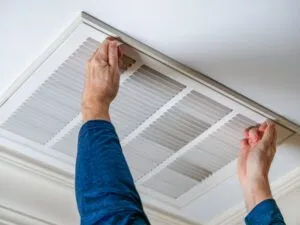
Indoor air quality (IAQ) is an important consideration relative to health. If a building’s IAQ is low, you may be exposed to pollutants that can affect your well-being. If you know answers to frequently asked questions surrounding the quality of air indoors, you are well equipped to take the right steps to optimize any building’s IAQ.
At Ambient Edge, we want to teach you about indoor air quality and its importance. Our team is happy to discuss IAQ and other air quality topics with you. To get started, please reach out to learn more about our heating and cooling services in Arizona and Nevada.
What You Need to Know About Indoor Air Quality
Indoor air pollutants can affect your quality of life without you even realizing it. You can experience the health effects of these pollutants immediately after you come into contact with them, the Environmental Protection Agency (EPA) points out. There can be times when exposure to indoor pollutants affects you in the years after your first exposure.
In the short term, indoor pollutants can cause you to experience dizziness, eye irritation, and other physical symptoms. These issues may seem minor at first but can escalate. For those who deal with indoor pollutants for an extended period of time, they may suffer respiratory problems and other long-lasting health issues.
Ambient Edge takes the guesswork out of IAQ. Our team can help you identify indoor air pollutants and ensure that you can boost your building’s IAQ moving forward. To learn more, please get in touch with us.
Why Indoor Air Problems Happen
Most indoor air problems are related to gases or particles in the air. These gases and particles can come from a variety of sources. Some of the most common sources of indoor pollution include:
- Live sources such as mold, mildew, and dust mites
- Carbon monoxide
- Nitrogen dioxide
- Sulfur dioxide
- Radon
Poor ventilation can contribute to indoor air pollution as well. If a building is not ventilated properly, pollutants can accumulate within a space. Meanwhile, only a limited amount of outdoor air may be able to enter the building, which can lead to indoor air issues.
Along with these issues, high temperatures and humidity can cause indoor air pollution. They can result in high concentrations of indoor pollutants. On top of that, these pollutants are unlikely to disappear on their own.
How Indoor Air Quality Is Determined
You can test your indoor air quality. Most IAQ tests will not allow you to test for all pollutants. Rather, many IAQ tests are specialized and allow you to test for certain types of pollutants, such as:
- Pollen, mold, and other biological contaminants
- Chemical contaminants found in paints, preservatives, and cleaning products
- Carbon monoxide and other combustion contaminants
Generally, you can complete an air quality test and send it to the company that provided you with the assessment to get the final result. The company will then provide you with a report that details your IAQ. If the quality of air in your building is poor, you can address the issue.
Tips to Improve Indoor Air Quality
If the quality of air at your home or business is less than ideal, there is no need to stress. At this point, there are several simple things that you can do to boost your IAQ. These include:
1. Change the Filter for Your Air-Conditioning System
An old filter can impact air quality and hamper your AC system’s performance. By picking up the best air filter for your home or business, you can instantly improve the quality of air in your space. From here, you can set up a maintenance routine to ensure that your AC system’s filter is changed regularly.
2. Manage the Humidity
Humid conditions can contribute to mold, mildew, and other pollutants that can make it tough to breathe indoors. You can protect against these problems by setting up dehumidifiers in different areas of your space. Also, you can monitor your space’s humidity levels and try to keep the humidity between 30-50%.
3. Pick Up Indoor Plants
Research shows that houseplants can help improve air quality. Ferns, lilies, and other small indoor plants can help you remove contaminants from the air. Select plants that are easy to maintain and make sure that they get a sufficient amount of sunlight and water.
4. Clean Your Air Ducts
It is typically a good idea to have a building’s air ducts cleaned every five to 10 years for residential properties and at least every five years for commercial buildings. You can partner with an air-duct cleaning and repair company. This enables you to receive a professional cleaning to remove pollutants from your building’s air ducts.
Why It Pays to Be Proactive About Indoor Air Quality
IAQ is often ignored, despite the fact that it can have far-flung effects on a person’s health. By prioritizing the quality of indoor air, you can get rid of pollutants before they contribute to severe health issues. Plus, you can enjoy clean indoor air that helps you feel your best.
If you have concerns about IAQ, it is beneficial to get help from a heating and cooling services company. This enables you to share your IAQ concerns with professionals who know what it takes to eliminate pollutants from the air. Next, these professionals can share personalized tips and recommendations to help you optimize your building’s air quality.
Of course, not all heating and cooling service companies are created equal. As you search for a company to help you boost your space’s indoor air quality, consider a business’ client reviews. You can read through these reviews to understand what it is like to work with a company, and they can help you determine if the business has what it takes to address your air quality issue.
Do Not Wait Any Longer to Improve the Quality of Air at Your Home or Business
The Ambient Edge team wants you to avoid indoor pollutants at all costs. We can learn about your air quality problem and help you resolve this issue in as little time as possible. To find out more or schedule an appointment, please contact us today.



